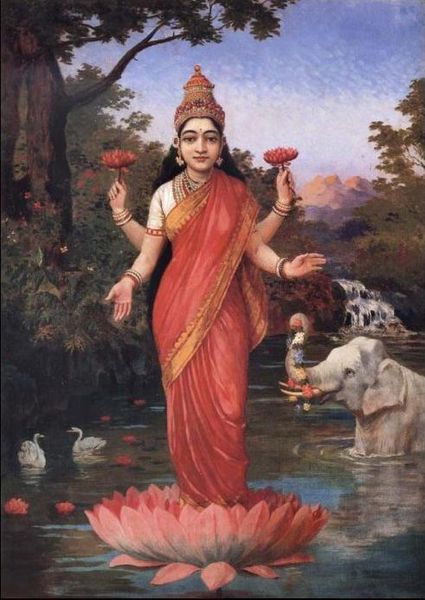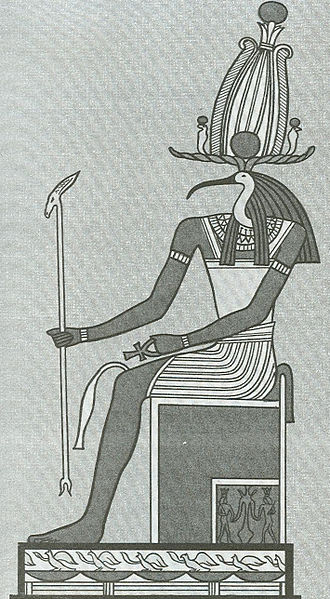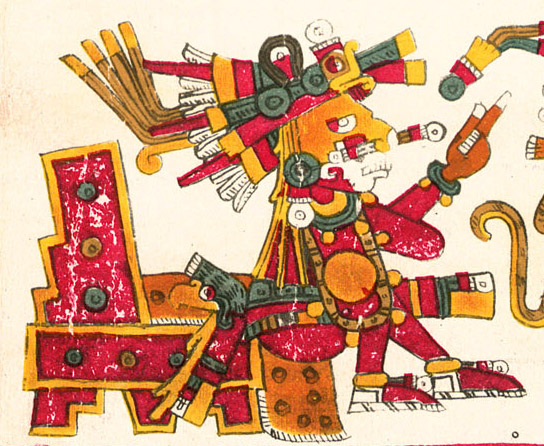There are few areas where humans need the help of the gods more than in the arena of luck. You can plan and work and plot, but if the dice are against you, it’s game over. Luck features prominently in many religions. The Christian Devil is often depicted making deals and gambling for the souls of the mortal, and the ancient Greeks credited Fortuna with all their gaming success. Even the Ancient Egyptians had someone to thank – or blame – depending on how that last game of Senet went. Below, I’ve gone through a few of the lesser-known gods and goddesses so you’ll know who to call upon the next time you pick up your dice.
Lakshmi
 Lakshmi is the Hindu goddess of fortune and prosperity, but don’t let the title fool you – she’s no fan of the greedy. It’s said that when Indra, god of war, was entrusted with protecting Earth from the demons, he grew proud. He was doing a great job, and he knew that with his skill and Lakshmi’s fortune, evil didn’t stand a chance. As usually happens, his pride led to arrogance, and he spurned the gift of a follower. Lakshmi decided that tough love was the best love, and she bailed, leaving the rest of the pantheon to struggle through about 1,000+ years of bad luck and misfortune.
Lakshmi is the Hindu goddess of fortune and prosperity, but don’t let the title fool you – she’s no fan of the greedy. It’s said that when Indra, god of war, was entrusted with protecting Earth from the demons, he grew proud. He was doing a great job, and he knew that with his skill and Lakshmi’s fortune, evil didn’t stand a chance. As usually happens, his pride led to arrogance, and he spurned the gift of a follower. Lakshmi decided that tough love was the best love, and she bailed, leaving the rest of the pantheon to struggle through about 1,000+ years of bad luck and misfortune.
The demons gained power and, gradually, took over. Indra finally appealed for help, and he was told that Lakshmi was waiting at the bottom of the sea. If he and the other gods churned it, she would rise to the top, as would gifts to help them fight off the demons. It took a millennium of stirring, but Lakshmi was finally satisfied by Indra’s determination and work ethic. She rose to the surface of the sea and helped the gods defeat the demons.
So don’t think of praying to Lakshmi unless you really mean it, because she’s just not into that. She’ll ignore your pleas if they aren’t sincere, but if you work hard, she’ll reward you with prosperity and success. Just don’t rest on your laurels, because she’ll leave as soon as she senses that you’re no longer upholding your side of the deal, and she’ll take all her good luck with her.
She’s celebrated primarily on Diwali, the festival of lights, after which many believers go out gaming and gambling in the hope that Lakshmi has bestowed her favor upon them.
Thoth
 Thoth is the ancient Egyptian god of gambling. By many accounts, he was later combined with the Greek god Hermes, so they share some attributes. Thoth was a major god on his own, though; he’s depicted as a man with the head of an ibis and a crescent moon crown, and he played a powerful role in the Egyptian pantheon. He’s said to be the creator of just about everything. All knowledge is attributed to him – which isn’t surprising considering that he invented writing. He served as scribe, messenger, and mediator to the rest of the pantheon, but two of his contributions stand out.
Thoth is the ancient Egyptian god of gambling. By many accounts, he was later combined with the Greek god Hermes, so they share some attributes. Thoth was a major god on his own, though; he’s depicted as a man with the head of an ibis and a crescent moon crown, and he played a powerful role in the Egyptian pantheon. He’s said to be the creator of just about everything. All knowledge is attributed to him – which isn’t surprising considering that he invented writing. He served as scribe, messenger, and mediator to the rest of the pantheon, but two of his contributions stand out.
The most interesting of these is the Book of Thoth, into which he recorded all the secrets of the universe. Obviously, this book no longer exists (unlike the Egyptian Book of the Dead, which was also attributed to him), but conspiracy theorists believe that it once did and that it may still be hidden somewhere deep within the pyramids. Of course, those same conspiracy theorists also believe that Thoth confessed in his book to being from Atlantis, so take it with a large grain of salt.
Thoth was also the creator of magic and was charged with mediating disputes among the divinity. He did so, at least in one case, via gambling. You know, like every great arbiter. In that case, the sky goddess Nut wanted to have children, but she wasn’t able to bear any during the 360 day year. Thoth stepped in and gambled with with Iabet, the moon, to win some light – enough to give us the five extra days of the year. Nut was able to have children during those days, and she didn’t waste any time. She gave birth to Isis and Osiris, among others, during that extra time. Still, I don’t think this is the best source to cite next time someone tells you that gambling ruins families.
Nohoilpi
The Navajo have a few legends around Nohoilpi, who is either a god or a powerful wizard, depending on your source. Either way, he’s really into gambling and games, and that earns him a place on this list.
Unlike most of our other entries, though, Nohoilpi wasn’t interested in betstowing his gifts upon mankind. Known as “He Who Wins Men,” this diety’s claim to fame was using his skill to indebt the Navajo. One myth tells the tale of Nohoilpi, the fallen son of the sun god, who journeyed to earth to teach the Navajo how to play games and gamble. Instead of favoring them with luck and imparting skill, he used his own superior skill to win at dice. When you lost a game to Nohoilpi, you payed with your freedom. He soon had enough slaves to build a city in his honor. The other gods caught on quickly, though, and sent a wise Navajo man to defeat Nohoilpi at dice. The man won, and the god was banished back to the heavens.
Another similar legend features Nohoilpi not as a god, but as a powerful magic man. Here, he again gambles with men, and when they lose, they become his slaves. This time, though, the gods do not intervene, but Nohoilpi’s twin brother stops by for a visit. An honorable man, Nohoilpi’s brother is persuaded by the townspeople to challenge Nohoilpi to a game. If the good twin won, he would banish his evil brother. The townspeople weren’t idiots, and they realized that Nohoilpi wasn’t going to fight fairly, so they gave the good twin tips. When the race began, their suspicions were confirmed – Nohoilpi wasted no time in using magic against his brother, but good prevailed. With the help of the village, the good twin was able to outsmart Nohoilpi and banish him back toward the heavens.
And when I say “banish” I mean shoot with an arrow that sent him flying into outer space.
Macuilxochitl
Saved the best for last. The Aztecs, guys. The Aztecs.
 Also known as “five flowers” or Xochipilli, Macuilxochitl is the Aztec god of gaming. The Aztecs loved their board games, and I’ll be delving into that in a later article, but for now it’s enough to know that this was the god to go to if you wanted to have a good time. He was also in charge of feasts, music, dancing, and all manner of enjoying yourself.
Also known as “five flowers” or Xochipilli, Macuilxochitl is the Aztec god of gaming. The Aztecs loved their board games, and I’ll be delving into that in a later article, but for now it’s enough to know that this was the god to go to if you wanted to have a good time. He was also in charge of feasts, music, dancing, and all manner of enjoying yourself.
The Aztecs honored Macuilxochitl with a yearly festival called Tecuilhuitontli. It was held during the harvest, and in typical Aztec fashion they got all dressed up, feasted and danced, and then killed a dude. Each year, they would dress a victim as Macuilxochitl and sacrifice him to the gods. They would then flay him and give his skin to a priest. You know, to wear.
Oh, Macuilxochitl was also another manifestation of the god of love. Obviously. Often depicted carrying a pointed stick, if he thrust his spear into your chest and it hit your heart, you were destined to fall in love. So, basically he’s like cupid, right? They’re practically the same.
They’re Aztec, so that was probably one of the least bloody metaphors in their mythology.
Fun fact: Macuilxochitl was also known for sending venereal disease to anyone who had sex during a fasting time. Clearly this gambler does not abide cheating.
Honorable Mention
I didn’t want to entirely leave out Li-Nezha, the mischievous Chinese god who is often depicted as a child. His legends differ greatly depending on which one you read, but they all share a thread of Li-Nezha being impulsive and eager to have fun – the classic trickster archetype. However, unlike many tricksters, he tended to play protector than antagonist. For example, he’s said to give out the winning lottery numbers on occasion.
I’m betting that only applies regionally, however.
![]()
Erin Ryan is a regular contributor to the site. What are your thoughts about games and luck? Feel free to share them with us over on our forums!
Photo Credits: Deities are of the public domain.
